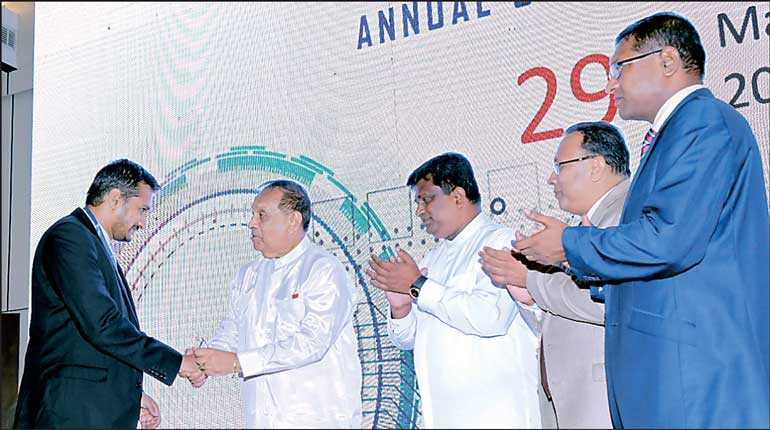Friday Feb 20, 2026
Friday Feb 20, 2026
Thursday, 11 April 2019 00:00 - - {{hitsCtrl.values.hits}}

Abbas Kamrudeen was ceremonially inducted as the Chairman of the Federation of Information Technology Industry Sri Lanka (FITIS) Friday, 29 March in the presence of a distinguished gathering including Speaker Karu Jayasuriya, Minster Digital Infrastructure and Information Technology, and members at the Galadari Hotel, Colombo.
 |
New Chairman Abbas Kamrudeen addressing the members |
A leading figure in the ICT industry, Kamrudeen, counts for over two decades experience in management primarily in the IT/BPO sector. With experience ranging from Regional Manager of Capita Group UK handling BPO operations of the BBC, to Director/CEO of AKLO Information Technologies Ltd., an ICT company operating in the South Africa, Japan and the South East Asian region. He now acts as the Managing Director of Debug Group of Companies, overlooking a number of technology companies within the Group which include Debug Computers, an ICT hardware an infrastructure company, ETL, a radio communications company, Debug Creative Labs, a software development firm and Sinetcom, an information security company.
After serving as an Executive Council member for the Federation of Information Technology Industry in Sri Lanka (FITIS) for four years, Abbas took over as President of the Software chapter in 2015 and reinstated as the president in 2016. Abbas was appointed the Co-Chairman of APICTA Awards 2015, held in Sri Lanka which was known to be one of the largest ICT events in the region with over 600 foreign delegates visiting Sri Lanka. Abbas was part of a number of Country Missions to Africa, Scandinavia, Australia, Europe and the Middle East with the task of promoting the country as an IT/BPO destination together with ICTA and EDB, while promoting the commercial interests of his company. Abbas also represented the Industry as a Committee Member of the Ceylon Chamber of Commerce.
Abbas now acts as a member of the Sri Lanka Institute of Directors. He is on the executive committee of Asia Pacific ICT Alliance (APICTA), has served as an international judge at the APICTA international awards and has also been appointed to the Director Board of the ICT Skills Council of Sri Lanka. He is a Board Director of the Federation of Chamber of Commerce and Industry Sri Lanka, and held the position of Vice Chairman of the Federation of IT Industry Sri Lanka.
His undying belief that knowledge creation and a knowledge economy is the only way forward for Sri Lanka, drives him towards educating and encouraging young students and entrepreneurs towards learning, experimenting and challenging themselves constantly. His one concern and objective is to improve the level of research work carried out in the island. “Sri Lankans lag far behind the world economies when it comes to research and innovation. It is our responsibility to change this,” he says.
Meanwhile, Lanka Bell Managing Director Dr. Prasad Samarasinghe was elected as the Senior Vice Chairman of FITIS and LK Domain Registry CEO Professor Gihan Dias, elected as Vice Chairman of FITIS.
Commenting on the way forward for FITIS and the industry, Kamrudeen focused on the mandate and purpose of the ICT industry. “We talk about a $ 5 billion export revenue target by 2022, which is a vital contribution but what more does this industry have to offer,” he stated.
“This is the industry that is going to drive every other industry forward. We have a very big responsibility. And it is time that we looked beyond selling a hardware or software to playing a role in digital transformation. We need to help organisations transform. Be it government, public, private or even individuals.
“We can have $ 5 billion in exports but if we have not played our role in digital transformation we have failed. So I request all members to take risk and expand their portfolio to introducing digital transformation solutions.
“So let me share one of the key strategies that I hope to implement in the coming year together with the support of the board and the executive committees. One of the key strategies would be to develop the digital ecosystem within the country. We would need to carry out certain activities to spark digital adoption within key industries. Banking and finance is one sector which has progressed well but most other sectors lag behind. We will also be introducing digital awards to recognise and encourage digitisation efforts by organisations.